Beth Kephart's Blog, page 122
July 22, 2013
When a memoir is not a memoir
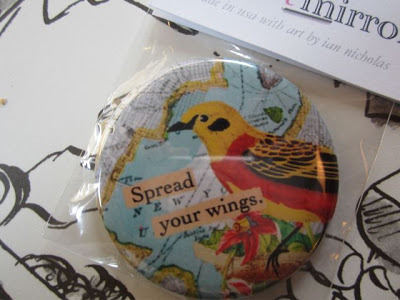
This weekend I bought and read two memoirs, reflections upon which I had hoped to share here.
That isn't going to happen, and the reason, quite simply, is this: These memoirs are not memoirs. They are autobiographies with big chunks of fiction thrown in.
I hate when that happens.
Because I try hard never to use my blog as a vehicle of negativity—because I know how it feels to see your book bruised by a reader's dismay—I will not name those books here, will not quote from them, will not throw you the double wink-wink. I will, instead, offer general thoughts on the form itself, especially those authorial decisions that can throw a memoir off the rails.
First, I always wonder about "memoirs" in which large swaths of dialogue are quoted at length. I grow especially concerned when that dialogue is sourced from a time before or during or just after (even a long time after) the writer's own birth. Who was recording these conversations in such detail? Did the baby-writer herself overhear the doctors talking, for example, and make special note of this for later? Did the father and mother bring pen and pad to the birthing room? Did they take note of who looked out the window when, and how the father adjusted his tie, and why the mother chose that particular instant to brush the hair from her eyes? Memory fails, and we make room for myths, and we understand the power of family lore. But when a writer goes on for many pages—chapters, even—about events that clearly no one recorded, when she asserts the facts rather than overtly imagines them, I find that I am, as a reader, in trouble.
Second, memoir is, in the end, more closely aligned with poetry and art than it is with records and documents. The writers I read this weekend were far more interested in plunking down the facts (or the invented facts) as purely informational fare, in sentences stripped bare. This happened to me, then this happened to me, then this happened to me, they wrote. Next chapter: This happened to me. So locked into the facts of their own story did these writers become that they forgot to look up and glance toward the reader and ask, Have you felt this way, too? Or, Life is funny, isn't it? These writers locked their readers out. They did not share the stage.
It's especially concerning—but enormously common—when both things happen at once. The writer both pretends to know many things that she cannot know (the art of fiction) and she sets those facts down so plainly and without artistic care that she is telegraphing (wittingly or not) her belief that the plot of her life is, in and of itself, enough. No need to play with structure. No need to hunt for themes. No need to play with a metaphor. What happened is big. It is sufficient. It is, by definition, memoir.
But it's not.
For more thoughts on the making of memoir, please visit my Handling the Truth: On the Writing of Memoir page.




Published on July 22, 2013 07:13
July 21, 2013
Notes on her Memory: the greenhouse, photographed in winter

In the Philadelphia Inquirer today, I remember my mother, who is buried at Valley Forge National Historical Park. In the early days following my mother's death, I would wander toward the Knox Estate greenhouse and think about rust and lost seeds. Later, I would come to sit on the bench near my mother's grave, which I had had designed for my father, and listen to the bells that sifted down.
The whole story is here. This is the greenhouse, as photographed in the winter of 2010.




Published on July 21, 2013 07:25
A Trick of the Light/Lois Metzger: Reflections
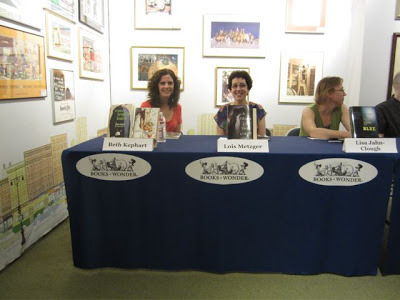
A few weeks ago, on a warm summer day, I made my way to Books of Wonder, in New York City, to panel-up with a number of pretty amazing young adult novelists. (I don't think panel-up is a real term, but I'm going with it.)
Beside me sat Lois Metzger, whose brand-new book—A Trick of the Light—brought out a crowd of Lois fans. Lois read from the book with a little off-stage help from her husband while their handsome son took photos.
A Trick of the Light sheds the spotlight on a little-discussed but surprisingly common condition—anorexia in teen boys (or "manorexia," as one of the characters puts its). Metzger's protagonist is an intelligent boy with family troubles—a young man who is taught the ravaging art of not eating by a young female friend. Narrated by the voice inside young Mike's head, the novel inventively presents the private thoughts of a boy whose increasingly distorted image of himself wreaks havoc on his life—and health. An ambulance will ultimately come for Mike. Rehabilitation will be required.
Lois did considerable research to write this book, and one feels the depth of her insight in passages like this one:
Everything that's good about you—anorexia loves it. Anorexia takes your intelligence and creativity and uses it to lie, repeatedly and convincingly, about why you don't eat, why you wear long underwear in the middle of the summer. Anorexia uses that work ethic to force you to exercise even when you're famished and exhausted.
A new and important look at an issue that deserves our attention, and compassion.




Published on July 21, 2013 05:50
July 20, 2013
Looking forward to the Writers Conference at the AJC Decatur Book Festival/August 30
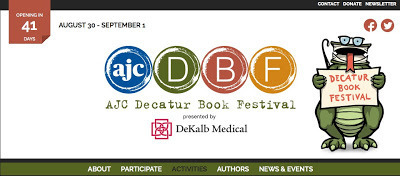
I'm looking forward to joining some really terrific teachers and writers for the upcoming Writers Conference at the AJC Decatur Book Festival. I'll be teaching memoir, but there are plenty of options that day.
I'm calling all Atlanta friends...
From the Decatur site (and more details here):
Keeping with tradition, the AJC Decatur Book Festival will hold its
annual Writers Conference on Friday, August 30th at Agnes Scott
College. A handful of stellar authors have been invited to kick off the
festival, teach workshops, and share their special knowledge and skills
with the public. This activity begins with a Writers Conference keynote
address at 2:30pm, spilling into workshops from 4pm until 6pm.
The keynote address will be given by Clyde Edgerton. He is the
author of ten novels, a book of advice, a memoir, and numerous short
stories and essays. Edgerton has been a Guggenheim Fellow, and five of
his novels have been New York Times Notable Books. He will be discussing writing and his new book Papadaddy’s Book For New Fathers: Advice to Dads of All Ages.
Edgerton will deliver his keynote speech from 2:30-3:30 p.m.
Refreshments and book sales follow. Individual writer workshops take
place at Buttrick Hall beginning at 4:00 p.m. Get your ticket now at http://ajcdbfwriterskeynote.eventbrite.com.
Take a look at our workshop descriptions below and follow the
EventBrite links to sign up! All workshops are free and open to the
public, with limited space.




Published on July 20, 2013 09:07
Remembering my mother and honoring my father, at Valley Forge, in today's Inquirer
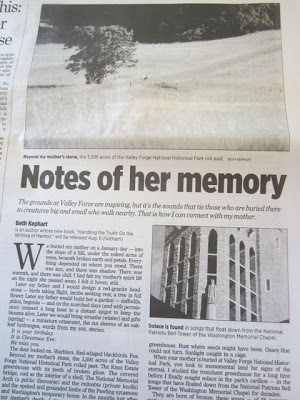
With thanks, as always, to Kevin Ferris, who allows me to sing these songs. Thanks, too, to the entire Inquirer team.




Published on July 20, 2013 07:17
July 19, 2013
On my son's birthday...
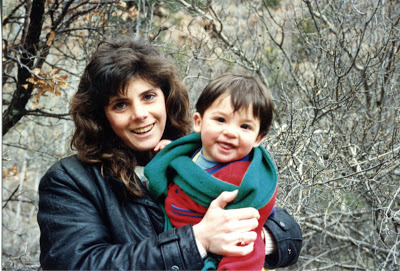
I think back over the years and all the joy he's wrought. Here we are, on our first trip together, to Santa Fe, where I, seduced by Willa Cather legends, had gone to turn thirty. He was so infinitely huggable. Still is.
And because he'll be here to celebrate the event, I'm making this a Beth Day Off (all except the 2 PM client presentation). There are presents to wrap. There are flowers to arrange. There's a tall, handsome, huggable guy with New York City stories to tell.




Published on July 19, 2013 02:56
July 18, 2013
shopping spree: negotiating the barbed heat of summer

Yesterday I dragged my bruised shoulder and slowly healing back to the mall, where I had not been since Christmas.
I'm not an expert shopper—find myself easily overcome by all the options, and the plain unknowability. Is there, for example, a better choice in another store? Should I keep looking—or stop? I shop unglamorously, my hair in a ponytail and my blue Nikes on. I shop without exhilaration. I shop ducking from people I once knew—the ones in light wool suits and pumps and grown-up shopping mall style.
Still, two birthdays are upcoming—my son's, and then my husband's—and I have a few places I need to go. And so, avoiding mirrors wherever I could, I explored the local King of Prussia Mall, where many of the stores I used to like are either gone or repositioned and where, for one frustrating moment, I could not find the stairs, and where, three times, like I had entered a Not Fun House, men approached me with a sad, yearning look in their eyes. Surely, they said, I understood that I would be much better off with their age-reducing skin elixirs.
I have a theory, and it's proving true in these banged-up, hot days of summer:
I'm not getting anywhere unless I laugh at myself.
I'll be at the Philadelphia Business Journal Women's Conference in the Crystal Tea Room of the Wanamaker Building, in two hours wearing my new dress and shoes. I hope I'm better at leading the Coffee Klatch than I'll ever be at shopping.




Published on July 18, 2013 03:45
July 17, 2013
Would you be the hat novelist? and writing withdrawal

So if you only had a hat upon which to write your novel, what would your novel say?
And would you write it under a pseudonym? Or would you be you—the hat novelist?
I have not written an ounce of fiction for nearly two months now.
I don't know where I'd begin.
I don't know if the vague but actual pain in my brain is symptom of withdrawal from writing stories.




Published on July 17, 2013 14:29
Would you be the hat novelist, and writing withdrawal?

So if you only had a hat upon which to write your novel, what would your novel say?
And would you write it under a pseudonym? Or would you be you—the hat novelist?
I have not written an ounce of fiction for nearly two months now.
I don't know where I'd begin.
I don't know if the vague but actual pain in my brain is symptom of withdrawal from writing stories.




Published on July 17, 2013 14:29
July 16, 2013
What's Your Story: Thoughts from Rebecca Solnit (The Faraway Nearby)
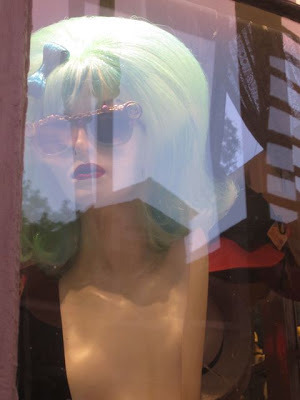
I buy every Rebecca Solnit book. I like the invented nature of her thoughts and prose. Today, facing all kinds of work deluge (and other such stuff), I share the opening paragraph from the Solnit book I'll read and review here as soon as the clouds settle.
But for now, Solnit's take on love—and stories.
What's your story? It's all in the telling. Stories are compasses and architecture; we navigate by them, we build our sanctuaries and our prisons out of them, and to be without a story is to be lost in the vastness of a world that spreads in all directions like arctic tundra or sea ice. To love someone is put yourself in their story, or figure out how to tell yourself their story.




Published on July 16, 2013 08:50



